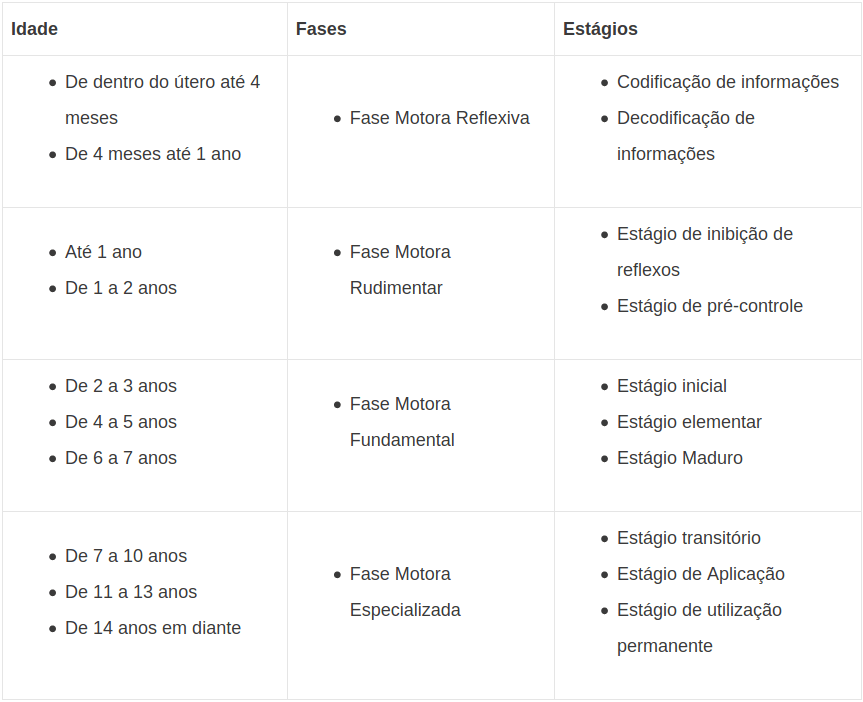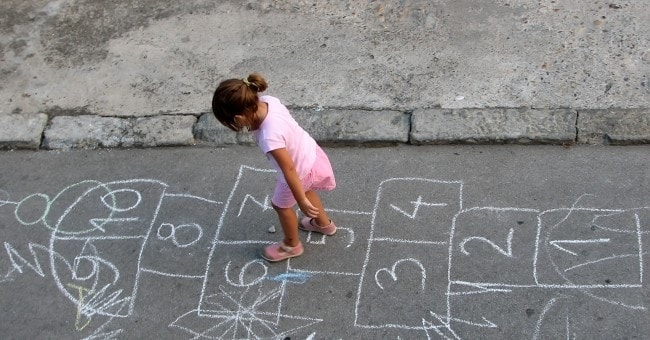Concepts of the Pedagogical Approach Developmental Physical Education
Some concepts must be known by the teacher so that he can apply the Developmental Physical Education Pedagogical Approach correctly in his Physical Education class: Physical Growth and Development; Physiological Development; Motor Development; Cognitive Development; Social Affective Development; Motor Skills; Motor Learning.
Among the concepts listed above, we will explain below those that we consider to be the main ones within the Developmental approach to Physical Education: Motor Skills, Motor Development and Motor Learning.
Motor Skill Concepts
Motor Skills are voluntary movements performed with the intention of achieving a certain goal efficiently. Motor Skills are: walking, running, balancing, holding, jumping, holding, releasing, throwing, kicking, etc…
Types of Motor Skills
Basic Motor Skills: These are the motor skills of locomotion (walking, running, jumping); manipulation (kicking, throwing, rebounding) and stabilization (turning, flexing, inverted positions).
Specific Motor Skills: Specific Motor Skills are skills influenced by culture, such as games, sports, dances and even work-related activities.
- Basic Motor Skills Video
Motor Development Concepts
Motor development is the way in which human beings move throughout their lives. Motor development is divided into phases and stages according to age:
Stages of Rudimentary Movements (up to 2 years)
- These are a child’s first forms of voluntary movement, i.e. they begin to voluntarily explore their environment;
- occur from birth to 2 years of age;
- rudimentary movements have a predictable sequence of appearance under normal conditions;
- but the appearance of this sequence of movements is interfered with by the environment and the individual;
- rudimentary movements include stabilization (sitting without support), locomotion (crawling, creeping, walking) and manipulation (holding and jumping on objects).
Fundamental Movements Phase (from 2 to 7 years)
The fundamental movements can be divided into:
- Stabilizers: dynamic balance, static balance, axial movements;
- Locomotor: walking, running, jumping, hopping;
- Manipulators: reaching, holding, releasing, throwing, receiving, kicking.
Specialized Movements Phase (7 to 14 years)
Specialized movements are called combinations of fundamental and culturally determined movements and are basically fundamental movements perfected according to the culture of the environment in which the motor skill was developed. Specialized Movements have a few stages:
- Transition Stage (7 to 10 years): the first attempts at combinations of fundamental movements and interest in complex activities such as dance, sports and fights;
- Application Stage (11 to 13 years old): students begin to recognize their motor potential, become interested in training their skills and show great improvement in the execution of sports techniques;
- Stage of permanent use (14 years onwards): in this stage the student can reach the best of their motor performance, they look for specific activities that interest them, they use the motor repertoire they have acquired throughout their life, they can use their motor skills for everyday activities, leisure and high-performance sports.

Motor Learning
The motor learning process is influenced by the environment in which it takes place, by the individual and their physical and biological conditions, and by the difficulty of the task.
Motor learning has three well-defined and identifiable stages:
- Cognitive stage: at this stage of motor learning there are many errors in performing movements, errors of a gross nature, the student can’t identify the errors, they need very specific instructions from the teacher to correct the errors and perform the movements;
- Associative stage: at this stage of motor learning, the student makes a few errors, but no gross ones. The student can already identify some errors without the teacher’s help;
- Autonomous Stage: the last stage of motor learning, the student already performs the movements of the skill autonomously, needs little attention to perform the movement, very few errors occur and the student is already aware of the errors and how to correct their mistakes.
Objectives of the Developmental Approach in Physical Education
The objective of the developmental approach to physical education is basically the motor development of the student through the learning of age-appropriate motor skills.
It’s important to note that although the developmental approach to physical education focuses on motor development and learning motor skills, it’s not possible in practice to separate motor development from the student’s cognitive and affective social development, i.e. during a physical education class with a developmental approach, the student is developing as a whole.
Developmental Approach Methodology in Physical Education
During a physical education lesson with a developmental approach, the teacher should provide the students with activities involving diversified and complex movements, according to the age and level of development (motor, physical, physiological) appropriate for that age group. From then on, the motor learning processes will take place until the student achieves the Motor Skills appropriate for that age group.
Assessment in Developmental Physical Education
In order to assess students within the concepts of the Developmental Approach to Physical Education, it is necessary to know the stages of acquisition of Motor Skills and the level of motor development appropriate for each age group. From there, the teacher will assess what level of development the student has achieved after the activities carried out in class.
Lesson Plan: Developmental Approach in Physical Education
In order to draw up a lesson plan according to the developmental pedagogical approach to physical education, it is necessary to identify the following items:
- Age of pupils: For example, if we’re drawing up a plan for sixth graders, the age range is 11 to 12 years;
- Phase of motor development: students in this age group are in the phase of specialized movements or the phase of combining fundamental and culturally determined movements;
- Motor development stage: the students in this class are at the application stage, i.e. they already recognize their motor potential and are interested in developing sports techniques.
After identifying these items, the teacher should choose a theme for the lesson, preferably in line with the content planning done for that class. For example, the Basketball theme could include body handling and ball handling activities. The teacher should observe the students during the activities, provide instructions and observe the students’ progress in the motor learning process.
Criticism of the Developmental Approach in Physical Education
The most common criticism leveled at the Developmental Physical Education pedagogical approach is that it fails to consider the influence of the socio-cultural context on the process of acquiring motor skills. For example, are basketball motor skills developed equally in the United States and Brazil? Certainly the socio-cultural context in the United States, where basketball is a sport that has been strongly introduced into their culture, facilitates the process of learning basketball-related motor skills, such as shooting, receiving, bouncing the ball, jumping with the ball.
More Lesson Plans
- Funk Lesson Plan in Physical Education
- Baião at School Lesson Plan
- Samba in School Lesson Plan
- Artistic Gymnastics Lesson Plan at School
- Parkour Lesson Plan in Physical Education
- Popular Games Lesson Plan
- Athletics Lesson Plan
- Badminton Lesson Plan
- Basketball Lesson Plan
- Volleyball Lesson Plan
- Handball Lesson Plan
More on Physical Education in Schools
- Dances in the BNCC Physical Education
- Wrestling in School Physical Education and the BNCC
- Play and Games in BNCC Physical Education
- Gymnastics in the BNCC Physical Education
- BNCC, Physical Education and Early Childhood Education
- Physical Education Course Plan with BNCC
- Sports in the BNCC
- BNCC for Physical Education in Primary School

